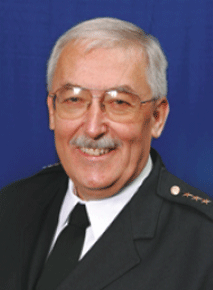
Throughout its history, the mission of the IACP has required the association to be actively involved in deliberations over public safety and homeland security policies. As police leaders, it is part of our responsibility to ensure that policy makers at all levels of government hear the insight of law enforcement professionals when they are considering matters that will affect our ability to protect the public we serve.
At no time is it more important for the voice of law enforcement to be heard than at the beginning of a new period of leadership. In the United States, it is at this early stage, when the new administration and Congress are formulating their approaches to criminal justice and homeland security issues, that we can have the greatest impact. That is why the IACP has been working so diligently to develop a relationship with President-elect Barack Obama and his staff. Already the IACP has held several meetings with key members of the incoming administration to discuss the critical public safety and homeland security challenges that the United States is confronting. At the same time, the IACP has continued working closely with key members of Congress to make sure that the needs and concerns of the law enforcement community are addressed and met.
The IACP has a unique position in Washington, D.C., the United States, and the world: representing the professional voice of law enforcement. The IACP neither endorses political candidates nor contributes to political campaigns. Instead, it stays above the political fray and focuses its energies on advancing legislative and executive initiatives that provide the law enforcement community with the tools necessary to fulfill its mission. This abstention from politics allows the IACP to do what is right without regard to how popular its position may be. Over the past several years, in part because of this philosophy, the IACP’s influence has continued to grow. We bring a professional, not a political, perspective to public policy debates.
But our success in these efforts is also dependent upon your involvement. I firmly believe that there is no more effective public safety advocate than police chiefs talking to their representatives, since we, as chiefs, possess the expertise on law enforcement issues that our representatives lack. We have the ability to serve as a resource for our elected leaders, to let them know which proposals would help us and which would hinder our ability to fulfill our mission. We do an excellent job with our state representatives, but we must continue to build on our efforts with those at the federal level. We must work to meet with them in Washington and at home.
That is why I urge you to act today to contact your senators and representatives. Visit with them when they are back in your district. Call them, write them, send them an e-mail message, send them a fax, but make every effort to make certain that they are aware of your concerns and those of the law enforcement community.
To assist you in this effort, this month the IACP will be releasing its legislative agenda for the 111th Congress. This comprehensive document, which is developed in consultation with the IACP’s committees and approved by the Executive Committee, provides policy makers with a clear and concise statement of the IACP’s positions on issues of national importance to law enforcement. Furthermore, it serves as a framework for the association’s legislative efforts for the next two years. Use this document as a starting point with your representatives, but also take the opportunity to discuss your local needs and concerns. The important task is to establish a relationship with your representative so that you can communicate with each other frequently on the issues facing your community and your profession.
It is my firm belief that at this critical time for our profession, when federal, state, tribal, and local law enforcement agencies are striving to protect the public from terrorists, sophisticated international gangs, online predators, and other violent criminals, it is extremely important that we, the law enforcement community, make our voices heard.
Our outreach efforts have already made an impact at the highest levels of government. In the October issue of the Police Chief, President-elect Obama, in response to questions presented by the IACP, outlined his positions on key issues affecting the law enforcement community. In his responses, Obama stated that he wants to restore funding to critical assistance programs, improve information- and intelligence-sharing capabilities, and guarantee that “local law enforcement is a full partner in the development of our homeland security strategy.” Additionally, the president-elect called for the need to reduce violent crime and drug trafficking throughout the country.
These are positive signs. However, we must not be content with what we have accomplished; we must build on this momentum and the hard work that the IACP and you have done in the past. If our efforts to reduce crime and promote homeland security are to have any chance of succeeding, it is absolutely vital for Congress and the administration to take the necessary steps that will allow the United States’ first line of defense—law enforcement—to mount effective programs to protect our communities from both crime and terrorism. I urge you to act today. ■


